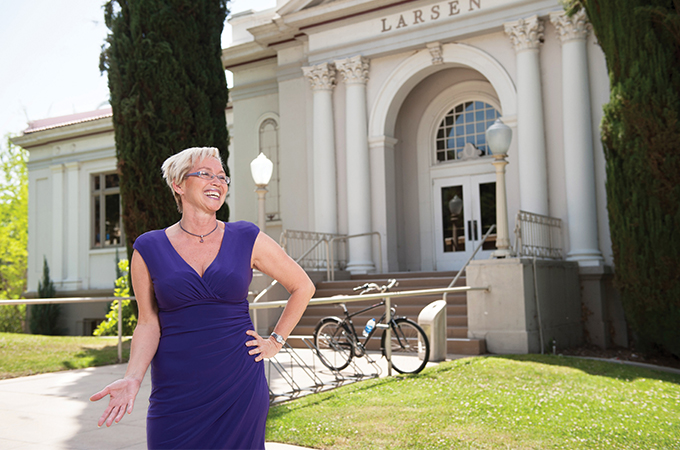When Catherine Salmon was considering a faculty position at the University of Redlands, the thing that most attracted her was the freedom to study what she wanted.
After all, her undergraduate degrees from McMaster University were in biology and comparative literature; her Ph.D., in psychology. Redlands gave Salmon the academic freedom she needed to pursue research in a variety of areas.
Salmon, a psychology professor, values an interdisciplinary approach. Her primary research interests include birth order and the family, reproductive suppression and dieting behavior, and female sexuality.
She has published three recent articles: “Why in Utero and Postnatal Birth Order Effects May Have Different Patterns”; “Long Term Romantic Relationships: Adaptionist Approaches”; and “A Cross-Disciplinary Survey of Beliefs about Human Nature and Culture.” She also is serving a six-year term as editor-in-chief of the American Psychological Association journal Evolutionary Behavioral Sciences.
Salmon wrote her dissertation on parental investment in birth order and how it affects relationships in and outside the family and has been researching birth order ever since. While much is known about first-born children, Salmon believes more research is necessary to understand the differences in personality between the middle- and last-born siblings.
Her 2011 book, The Secret Power of Middle Children: How Middleborns Can Harness Their Unexpected and Remarkable Abilities, was co-authored with journalist Katrin Schumann and was meant to assist middleborn children of all ages (and their parents) to use their birth order as a strategy for success. Using an interdisciplinary approach and little-known research from evolutionary psychology, sociology, and communications, the book illustrated how the adaptive strategies that middleborns develop translate into stronger friendships, lasting marriages, successful careers, and effective parenting.
Salmon says her paper, “Why in Utero and Postnatal Birth Order Effects May Have Different Patterns,” targets the fraternal birth order effect. “The fraternal birth order is used by some people to explain the fact that the likelihood of a boy being homosexual increases with the number of older brothers he has,” she notes. “It’s not completely understood but it is speculated that the mother’s body manipulates the uterine environment to reduce competition between her sons or that she has an immune reaction to having lots of sons.” Salmon’s research, however, focuses on post-birth environmental effects.
Insight into birth order is important, Salmon notes, because it helps us understand ourselves. “I think it’s useful to understand your own strategies and approaches as well as those of others,” she explains. “It’s helpful for us when we think about job opportunities, making it easier to find our career pathways.”
Salmon has been featured on The Today Show, Anderson Cooper 360, NPR, Oxygen and the Science Channel. She has co-edited a variety of books, including the recent Oxford Handbook of Evolutionary Family Psychology and writes a blog on birth order for Psychology Today called “Ape Girl.”
She appreciates the eclectic interests of University of Redlands faculty members and thinks they provide an advantage. “Most Redlands faculty have a real curiosity about the world around them, about scholarship, and about teaching,” she says. “We have the opportunity to affect students with our enthusiasm, do research with them, and offer them the chance to explore.”
To learn more, see Salmon’s faculty page and the Psychology Department webpages.






